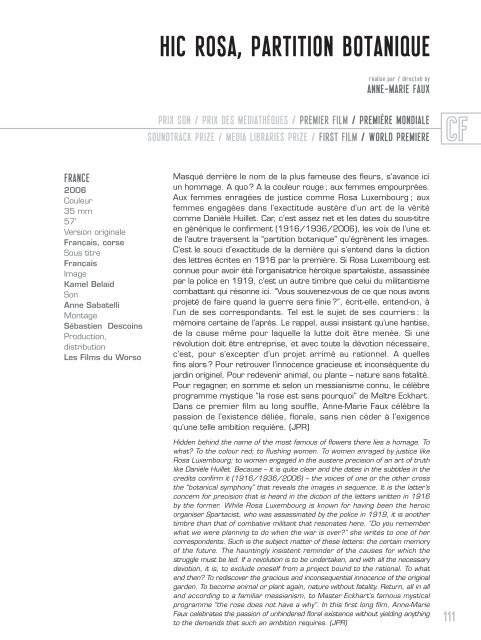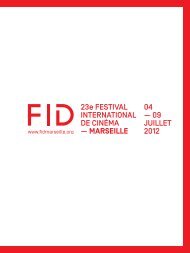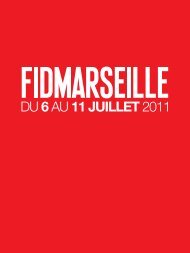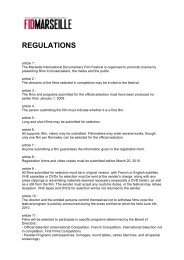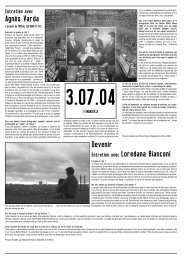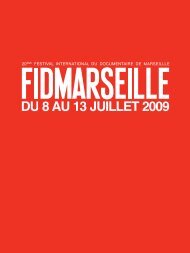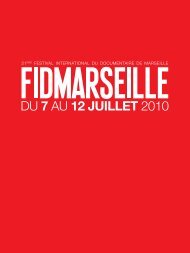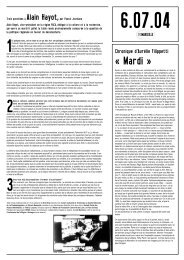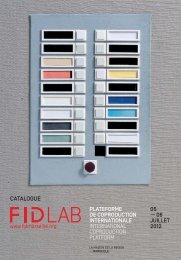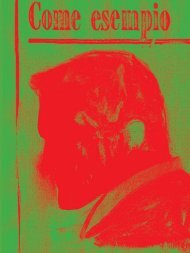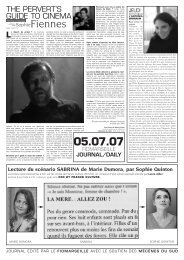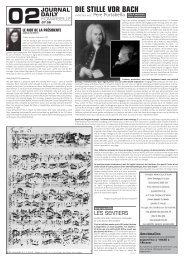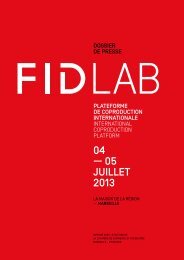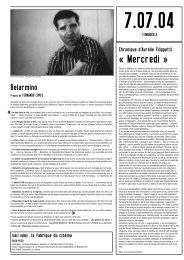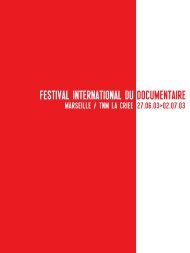HARUKI YUKIMURA & NANA-CHANréalisé par / directeb byXAVIER BRILLATPREMIÈRE MONDIALEWORLD PREMIERELes li<strong>en</strong>s <strong>du</strong> cinéma avec l’univers <strong>du</strong> fantasme, le voyeurismeet l’érotisme sont bi<strong>en</strong> connus. Du désir au plaisir (<strong>de</strong>s protagonistes),<strong>de</strong> la pulsion scopique à la gêne (<strong>de</strong>s spectateurs), le film <strong>de</strong> XavierBrillat, <strong>en</strong> joue, nous mettant dans une situation inconfortable. Quelquepart au Japon, un homme, Haruki Yukimura et une femme, Nana-Chan, s’adonn<strong>en</strong>t au bondage. Mais la l<strong>en</strong>teur <strong>de</strong>s gestes, la douceur<strong>de</strong>s voix, le parti pris d’<strong>en</strong>chaîner les scènes par <strong>de</strong>s fon<strong>du</strong>s au noir,la prés<strong>en</strong>ce ténue <strong>de</strong> bruissem<strong>en</strong>ts <strong>de</strong> la nature, tout nous invite àsortir <strong>de</strong> l’évid<strong>en</strong>ce voyeuriste. D’une situation qui ne pourrait êtrequ’érotique, le film nous amène peu à peu vers la performance, lacérémonie ritualisée : le corps <strong>de</strong> la femme, corps attaché, corpssoumis, corps contraint, lieu d’inscription <strong>du</strong> nouage pati<strong>en</strong>t etméticuleux <strong>de</strong> l’homme, nous offre une succession <strong>de</strong> poses, sinond’étapes. Pour qui ? Pour elle, pour lui, pour nous ? A l’ambiguité <strong>de</strong>la situation filmée répond celle <strong>de</strong> l’homme et <strong>de</strong> la femme : elle, toutuniquem<strong>en</strong>t actrice (elle <strong>de</strong>vi<strong>en</strong>t l’objet d’un spectacle) et modèle (elleabandonne son corps à la pose), s’offre à la jouisance <strong>de</strong> l’autrecomme à la si<strong>en</strong>ne propre ; lui par la médiation <strong>de</strong>s cor<strong>de</strong>s et <strong>de</strong>sli<strong>en</strong>s, évolue <strong>en</strong>tre regard et toucher, <strong>en</strong>tre précision <strong>du</strong> geste etjouissance <strong>de</strong> l’image. Tous <strong>de</strong>ux, comme la distance adoptée parXavier Brillat, r<strong>en</strong>voi<strong>en</strong>t à notre propre regard, dans un mouvem<strong>en</strong>tparadoxal d’approriation et <strong>de</strong> distance, dans ce qui pourrait être unedouble métaphore, <strong>du</strong> li<strong>en</strong> amoureux et <strong>du</strong> li<strong>en</strong> <strong>du</strong> regar<strong>de</strong>ur avecl’objet <strong>de</strong> ses fantasmes. (NF)FRANCE2006CouleurDV Cam38’Version originaleJaponaisSous titreFrançaisImageXavier BrillatMontageJerôme MillionFilmographieDancing, 2003Ceci est une pipe,2001110The links betwe<strong>en</strong> the cinema and the world of fantasy, voyeurism and eroticismare well-established. Xavier Brillat’s film plays on these, from the <strong>de</strong>sire andpleasure (of the protagonists) to the compulsion to watch and unease (of theaudi<strong>en</strong>ce), making us feel uncomfortable. Somewhere in Japan a man, HarukiYukimura, and a woman, Nana Chan in<strong>du</strong>lge in bondage. Yet the slowness of theirgestures, the g<strong>en</strong>tl<strong>en</strong>ess of their voices, the faint murmurings of nature andBrillat’s <strong>de</strong>cision to link the sc<strong>en</strong>es together with fa<strong>de</strong>-outs into darkness, allconspire to draw us out of a simply voyeuristic position. From a situation whichcould only be erotic, the film gra<strong>du</strong>ally leads us towards performance, towardsritualised ceremony: a woman’s body, tied up, submissive and constrained andthe man’s preoccupation with pati<strong>en</strong>t and meticulous knotting pres<strong>en</strong>t us with asuccession of poses and stages of int<strong>en</strong>sity. For whom? For her, for him, for us?The ambiguity of the man and woman is in tune with the ambiguity of this filmedsituation: the woman is at once an actress (she becomes the focus of a show)and mo<strong>de</strong>l (she gives her body over completely to a pose), offering herself up tothe man’s s<strong>en</strong>sual pleasure as well as her own. The man reaches climax withropes and binding, through looking and touching, precise gestures and revellingin what he sees before him. The two of them, like the distance which Xavier Brillathas adopted, look back to confront our own gaze – in a contradictory movem<strong>en</strong>twhich is both possessive and distant and could be a double metaphor – the bondof love and the bond betwe<strong>en</strong> a behol<strong>de</strong>r and the object of his fantasies. (NF)
HIC ROSA, PARTITION BOTANIQUEréalisé par / directeb byANNE-MARIE FAUXPRIX SON / PRIX DES MÉDIATHÈQUES / PREMIER FILM / PREMIÈRE MONDIALESOUNDTRACK PRIZE / MEDIA LIBRARIES PRIZE / FIRST FILM / WORLD PREMIERECFFRANCE2006Couleur35 mm57’Version originaleFrançais, corseSous titreFrançaisImageKamel BelaïdSonAnne SabatelliMontageSébasti<strong>en</strong> DescoinsPro<strong>du</strong>ction,distributionLes Films <strong>du</strong> WorsoMasqué <strong>de</strong>rrière le nom <strong>de</strong> la plus fameuse <strong>de</strong>s fleurs, s’avance iciun hommage. A quo ? A la couleur rouge ; aux femmes empourprées.Aux femmes <strong>en</strong>ragées <strong>de</strong> justice comme Rosa Luxembourg ; auxfemmes <strong>en</strong>gagées dans l’exactitu<strong>de</strong> austère d’un art <strong>de</strong> la véritécomme Danièle Huillet. Car, c’est assez net et les dates <strong>du</strong> sous-titre<strong>en</strong> générique le confirm<strong>en</strong>t (1916/1936/2006), les voix <strong>de</strong> l’une et<strong>de</strong> l’autre travers<strong>en</strong>t la “partition botanique” qu’égrèn<strong>en</strong>t les images.C’est le souci d’exactitu<strong>de</strong> <strong>de</strong> la <strong>de</strong>rnière qui s’<strong>en</strong>t<strong>en</strong>d dans la diction<strong>de</strong>s lettres écrites <strong>en</strong> 1916 par la première. Si Rosa Luxembourg estconnue pour avoir été l’organisatrice héroïque spartakiste, assassinéepar la police <strong>en</strong> 1919, c’est un autre timbre que celui <strong>du</strong> militantismecombattant qui résonne ici. “Vous souv<strong>en</strong>ez-vous <strong>de</strong> ce que nous avonsprojeté <strong>de</strong> faire quand la guerre sera finie ?”, écrit-elle, <strong>en</strong>t<strong>en</strong>d-on, àl’un <strong>de</strong> ses correspondants. Tel est le sujet <strong>de</strong> ses courriers : lamémoire certaine <strong>de</strong> l’après. Le rappel, aussi insistant qu’une hantise,<strong>de</strong> la cause même pour laquelle la lutte doit être m<strong>en</strong>ée. Si unerévolution doit être <strong>en</strong>treprise, et avec toute la dévotion nécessaire,c’est, pour s’excepter d’un projet arrimé au rationnel. A quellesfins alors ? Pour retrouver l’innoc<strong>en</strong>ce gracieuse et inconséqu<strong>en</strong>te <strong>du</strong>jardin originel. Pour re<strong>de</strong>v<strong>en</strong>ir animal, ou plante – nature sans fatalité.Pour regagner, <strong>en</strong> somme et selon un messianisme connu, le célèbreprogramme mystique “la rose est sans pourquoi” <strong>de</strong> Maître Eckhart.Dans ce premier film au long souffle, Anne-Marie Faux célèbre lapassion <strong>de</strong> l’exist<strong>en</strong>ce déliée, florale, sans ri<strong>en</strong> cé<strong>de</strong>r à l’exig<strong>en</strong>cequ’une telle ambition requière. (JPR)Hidd<strong>en</strong> behind the name of the most famous of flowers there lies a homage. Towhat? To the colour red; to flushing wom<strong>en</strong>. To wom<strong>en</strong> <strong>en</strong>raged by justice likeRosa Luxembourg; to wom<strong>en</strong> <strong>en</strong>gaged in the austere precision of an art of truthlike Danièle Huillet. Because – it is quite clear and the dates in the subtitles in thecredits confirm it (1916/1936/2006) – the voices of one or the other crossthe “botanical symphony” that reveals the images in sequ<strong>en</strong>ce. It is the latter’sconcern for precision that is heard in the diction of the letters writt<strong>en</strong> in 1916by the former. While Rosa Luxembourg is known for having be<strong>en</strong> the heroicorganiser Spartacist, who was assassinated by the police in 1919, it is anothertimbre than that of combative militant that resonates here. “Do you rememberwhat we were planning to do wh<strong>en</strong> the war is over?” she writes to one of hercorrespond<strong>en</strong>ts. Such is the subject matter of these letters: the certain memoryof the future. The hauntingly insist<strong>en</strong>t remin<strong>de</strong>r of the causes for which thestruggle must be led. If a revolution is to be un<strong>de</strong>rtak<strong>en</strong>, and with all the necessary<strong>de</strong>votion, it is, to exclu<strong>de</strong> oneself from a project bound to the rational. To what<strong>en</strong>d th<strong>en</strong>? To rediscover the gracious and inconsequ<strong>en</strong>tial innoc<strong>en</strong>ce of the originalgard<strong>en</strong>. To become animal or plant again, nature without fatality. Return, all in alland according to a familiar messianism, to Master Eckhart’s famous mysticalprogramme “the rose does not have a why”. In this first long film, Anne-MarieFaux celebrates the passion of unhin<strong>de</strong>red floral exist<strong>en</strong>ce without yielding anythingto the <strong>de</strong>mands that such an ambition requires. (JPR)111
- Page 3 and 4:
SOMMAIRE/CONTENTSSPARTENAIRES/PARTN
- Page 5 and 6:
Le Festival International du Docume
- Page 7 and 8:
AURÉLIE FILIPETTIPRÉSIDENTE DU CO
- Page 9 and 10:
JEAN-CLAUDE GAUDINMAIRE DE MARSEILL
- Page 11 and 12:
MICHEL VAUZELLEPRÉSIDENT DE LA RÉ
- Page 13 and 14:
CHRISTINE ALBANELMINISTRE DE LA CUL
- Page 15 and 16:
VÉRONIQUE CAYLADIRECTRICE GÉNÉRA
- Page 17 and 18:
JEAN-NOËL GUÉRINISÉNATEUR, PRÉS
- Page 19 and 20:
RICHARD BOIDINDIRECTEUR DE L’AUDI
- Page 21 and 22:
OLIVIER MILLEPRÉSIDENT DE LA COMMI
- Page 23 and 24:
BÉNÉDICTE CHEVALLIERDÉLÉGUÉE G
- Page 25 and 26:
FRANCK GABRIELDIRECTEUR DE LA COMMU
- Page 27 and 28:
JEAN-FRANÇOIS MATTEICONSEILLER MUN
- Page 29 and 30:
BERNARD FAVIERPRÉSIDENT DU GNCRÉD
- Page 31:
PRIXAWGrand Prix de la Compétition
- Page 35 and 36:
APICHATPONG WEERASETHAKULRéalisate
- Page 37 and 38:
ANGELA SCHANELECRéalisatrice / Fil
- Page 39 and 40:
ENRICO GHEZZIRéalisateur / Film Di
- Page 41 and 42:
JEAN ECHENOZÉcrivain (France)JURY
- Page 43 and 44:
NATHALIE RICHARDComédienne / Actre
- Page 45 and 46:
JÉRÔME BEAUJOURScénariste / Scri
- Page 47 and 48:
MANOUSHAK FASHAHIRéalisatrice / Di
- Page 49 and 50:
GILLES LAURENTIngénieur du son / S
- Page 51 and 52:
PATRICE NEZANProducteur / Producer
- Page 54 and 55:
CÉDITORIALEighteenth Festival, eig
- Page 58 and 59:
LOVE CONQUERS ALLRETURN OF THE POET
- Page 60 and 61: AUTOHYSTORIAréalisé par / directe
- Page 62 and 63: DE SON APPARTEMENTTO HIS APARTMENTS
- Page 64 and 65: GHIRO GHIRO TONDOréalisé par / di
- Page 66 and 67: HOréalisé par / directeb byGAËLL
- Page 68 and 69: JOURNAL N O 1RETURN OF THE POET / L
- Page 70 and 71: MOSTRAMEMONTRE MOI / SHOW MEréalis
- Page 72 and 73: RUE SANTA FÉréalisé par / direct
- Page 74 and 75: THE HALFMOON FILESréalisé par / d
- Page 76 and 77: THE PERVERT’S GUIDE TO CINEMARETU
- Page 82: Sachez toutavant tout le monde !Cha
- Page 86 and 87: Sablé-sur-Sarthe, Sarthe, de Paul
- Page 88 and 89: 1. ORAKEL (Orakel von Prohlis), de
- Page 90 and 91: The halfmoon files, de Philip Schef
- Page 92 and 93: Journal n°1, de Hito SteyerlTentat
- Page 94 and 95: Cène, de Andy Guerif
- Page 96 and 97: Hic Rosa, partition botanique, de A
- Page 98 and 99: Des Indes à la planète Mars, de C
- Page 100: The Pervert's Guide to Cinema, de S
- Page 104: La Fondation d’entreprise Ecureui
- Page 107 and 108: CÈNEréalisé par / directeb byAND
- Page 109: FRANCE 2007réalisé par / directeb
- Page 113 and 114: MAFROUZA - OH LA NUIT!réalisé par
- Page 115 and 116: NAWNA (JE NE SAIS PAS...)réalisé
- Page 117 and 118: TRABALHO ESCRAVOréalisé par / dir
- Page 122 and 123: MICHEL TREGAN
- Page 124 and 125: MICHEL TREGANabsolument, et quand i
- Page 126 and 127: MICHEL TREGAN11 ans, est l’objet
- Page 128 and 129: MICHEL TREGANthe immensity of his w
- Page 130 and 131: MICHEL TREGAN“Juventude em marcha
- Page 132 and 133: CASA DE LAVARÉTROSPECTIVE PEDRO CO
- Page 134 and 135: NO QUARTO DA VANDAMICHEL DANS LA TR
- Page 136 and 137: OÙ GIT VOTRE SOURIRE ENFOUI?ONDE J
- Page 138 and 139: NE CHANGE RIENMICHEL TREGANRÉTROSP
- Page 140 and 141: MICHEL TREGANRÉTROSPECTIVE PEDRO C
- Page 142 and 143: BILLIE HOLIDAY CHANTE “FINE AND M
- Page 144 and 145: OS VERDES ANOSMICHEL VERTES TREGAN
- Page 146 and 147: JAIMEMICHEL TREGANréalisé par / d
- Page 148 and 149: UNKNOWN CHAPLINMICHEL TREGANréalis
- Page 150 and 151: MICHEL TREGANÉcranPresto se dépli
- Page 152 and 153: MICHEL TREGANScreenPresto divides i
- Page 154 and 155: DAMO SUZUKI, LE CHANT DE L’IMPREV
- Page 156 and 157: HOMEMADEMICHEL LA MAQUETTE TREGANr
- Page 158 and 159: OPERA JAWAMICHEL TREGANréalisé pa
- Page 160 and 161:
MICHEL TREGANPRESTO / A TEMPOIn the
- Page 162 and 163:
TONITE LET’S ALL MAKE LOVE IN LON
- Page 164 and 165:
AU FIL DU SON - UN PORTRAIT DE YANN
- Page 166 and 167:
D. O. A.MICHEL TREGANréalisé par
- Page 168 and 169:
MICHEL TREGANPRESTO / DA CAPOImages
- Page 170 and 171:
SUFFERING AND SMILINGMICHEL TREGANr
- Page 172 and 173:
MICHEL TREGANThe proposition is a v
- Page 174 and 175:
HÔTEL MONTEREYMICHEL TREGANréalis
- Page 176 and 177:
DIE LEERE MITTETHE EMPTY CENTREréa
- Page 178 and 179:
CHACUN SA PALESTINEMICHEL EVERYBODY
- Page 180 and 181:
IMAGO MUNIDI. DAS GÜLTIGE, SAGBARE
- Page 182 and 183:
KURZ DAVOR IST ES PASSIERTMICHEL IT
- Page 184 and 185:
PASOLINI PA* PALESTINEMICHEL TREGAN
- Page 186 and 187:
MICHEL TREGAN
- Page 188 and 189:
MICHEL TREGANRevolver is a magazine
- Page 190 and 191:
SCHLÄFERMICHEL SLEEPERTREGANréali
- Page 192 and 193:
MICHEL TREGANImagine the following
- Page 194 and 195:
DAS MODELLLA MAQUETTEréalisé par
- Page 196 and 197:
JEUNES LUMIÈRESMICHEL TREGANréali
- Page 198 and 199:
PAULMICHEL TREGANréalisé par / di
- Page 201 and 202:
Das Modell, de Florian GwinnerJaime
- Page 203 and 204:
Au fil du son, un portrait de Yann
- Page 205 and 206:
Unfaithfully yours, de Preston Stur
- Page 207 and 208:
Performing the border, de Ursula Bi
- Page 209 and 210:
Arcana, de Cristobal Vicente Contai
- Page 211 and 212:
Black sea files, de Ursula Biemann
- Page 213 and 214:
Anthem, de Apichatpong Weerasethaku
- Page 215 and 216:
Igor Stravinsky, composer, de Janos
- Page 217:
Le goût des olives, de Anne Lacour
- Page 223 and 224:
CONSEIL RÉGIONALSPJust back from s
- Page 225 and 226:
GAMBITréalisé par / directeb bySA
- Page 227 and 228:
THE LAST MOVIEréalisé par / direc
- Page 230:
TABLES RONDES / ROUND TABLESTABLE R
- Page 233 and 234:
Monday July 2 to Friday July 13, 20
- Page 235 and 236:
An exhibition of work by Mariusz Gr
- Page 237 and 238:
PETER FRIEDL, TRAVAIL 1964-2006PETE
- Page 239 and 240:
PHILIPPE GRANDRIEUX:INSTALLATIONS,
- Page 241 and 242:
RENCONTRES: UN FILM, UN RÉALISATEU
- Page 244 and 245:
MICHEL TREGANVIDÉOTHÈQUE / VIDEO
- Page 246 and 247:
MICHEL TREGANVIDÉOTHÈQUE / VIDEO
- Page 248 and 249:
MICHEL TREGANVIDÉOTHÈQUE / VIDEO
- Page 250 and 251:
MICHEL TREGANVIDÉOTHÈQUE / VIDEO
- Page 252 and 253:
MICHEL TREGANVIDÉOTHÈQUE / VIDEO
- Page 254:
MICHEL TREGANVIDÉOTHÈQUE / VIDEO
- Page 257 and 258:
REMERCIEMENTS / ACKNOWLEDGEMENTSJEA
- Page 259 and 260:
INDEXINDEX DES FILMS / INDEX OF FIL
- Page 261 and 262:
INDEXCONTACTSI.Mille et une. FilmsT
- Page 263 and 264:
INDEXCONTACTSIEchakhch Latifa (à c
- Page 265 and 266:
INDEXCONTACTSIPierre Grise Distribu


